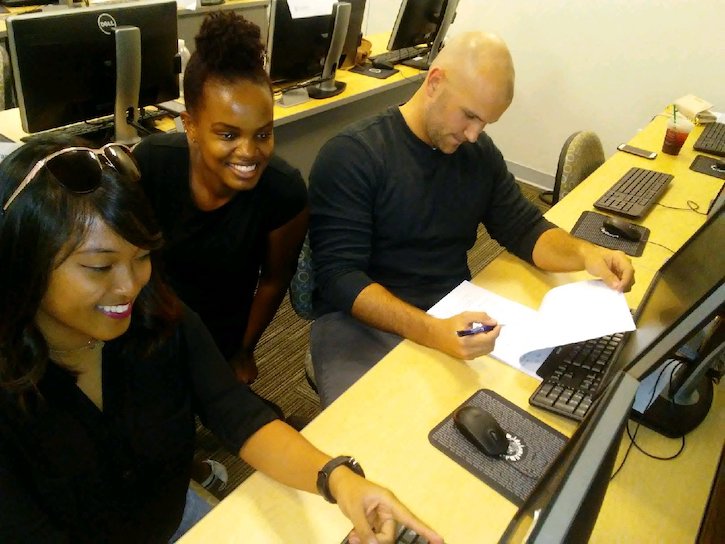
Students (from l to r) Jasmine Doctolero, T'awna Williams and Dan Vandiver work together while at Mason for the Criminal Investigations and Network Analysis Center's (CINA) Summer Immersion Week. Photo by John Hollis.
Dan Vandiver said the week he recently spent at George Mason University has given him a much better understanding of the many opportunities available to him in the fields of computer science, criminal investigations, and digital forensic science.
A rising senior from California State University – San Marcos, Vandiver was part of a group of 18 undergraduate and graduate students and faculty from around the country who recently came to Mason for the Criminal Investigations and Network Analysis Center’s (CINA) Summer Immersion Week. The students were introduced to skills used by federal investigators and learned specifics about potential careers within the Department of Homeland Security by engaging with scholars and researchers from Mason and other minority-serving institutions (MSI), as well as DHS representatives.
Anthony Stefanidis, the director of CINA, said the week-long experience provided an excellent opportunity for students to receive a solid overview of educational and research topics that are at the core of the CINA Center.
“It’s blown me away,” Vandiver said of his experience. “I figured there’d be some software, some tech analysis. But it’s really been an amazing week and I’ve learned so much.”
And that was just the point.
“We provided these CINA student-scholars with a unique understanding of emerging skillsets that will help them in their future careers,” Stefanidis said. “At CINA, we feel very strongly about supporting underrepresented groups and this unique summer program is an expression of this principle.”
CINA is part of the network of nine unique DHS Centers of Excellence whose aim is to bring together leading experts and researchers to pursue multidisciplinary approaches to address the disruption of criminal activities across the physical and cyber spaces that have lasting detrimental effects on people throughout the world and the environment. Some of these activities include money laundering, human trafficking, organ and tissue trafficking and environmental crimes.
The CINA at Mason researchers who spoke to the group included David Weisburd, a Distinguished Professor and the executive director of the Center for Evidence-Based Crime Policy within the College of Humanities and Social Sciences; Louise Shelley, a University Professor and the executive director of the Terrorism, Transnational Crime and Corruption Center (TraCCC) within the Schar School of Policy and Government; and Jim Jones, an associate professor in the Digital Forensics and Cyber Analysis program within the Volgenau School of Engineering.
The Mason-led consortium aims to use science to further develop cutting-edge solutions to the problems.
“I’m very curious in all the areas of science,” said T’awna Williams, a graduate student from California State University – Los Angeles who is working on a master’s degree in forensic psychology. “Given the diversity of options here, you can definitely find something. The multidisciplinary approach is really interesting and makes young people want to come into the field.”
Jasmine Doctolero, a rising senior computer science major at California State University – San Marcos, said that she was impressed by all that she’d learned during the week.
“It’s been amazing meeting these professors and having the chance to talk with them about what they do,” she said. “I liked how it was all so very different, but they all came together to work toward the same solution.”
Student engagement opportunities continue throughout the summer. On July 31-August 1, Mason’s CINA Center will again host the DHS COE Summit bringing hundreds of researchers, government and industry attendees to its Arlington, VA campus to explore emerging challenges and solutions for the Homeland Security Enterprise.
To learn more about CINA Center events and programs, please visit the center’s website.
